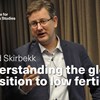departs
Should Extinction Be Forever?
Should Extinction Be Forever?, Philosophy and Technology, First online: 17 october 2015 This article will explore a problem which is related to our moral obligations towards species. Although the re-cr, (6128), 32–33, ). This article will provide an argument in favour of re-creation based on normative considerations. The environmentalist community generally accepts that it is wrong to exterminate species, for reasons beyond any instrumental value these species may have. It is often also claimed that humanity has a collective responsibility to either preserve or at least to not exterminate species. These two beliefs are here assumed to be correct. The argument presented here departs from and places these two ideas in a deontological framework, from which it is argued that when humanity causes the extinction of a species, this is a moral transgression, entailing a residual obligation. Such an obligation implies a positive duty to mitigate any harm caused by our moral failure. In light of recent scientific progress in the field of genetic engineering, it will be argued that humanity has a prima facie obligation to re-create species whose extinction mankind may have caused, also known as de-extinction.
Annual reports and annual activity reports
The annual reports and annual activity reports are available in Swedish only. Find them on our Swedish website >
In defense of value incomparability: A reply to Dorr, Nebel, and Zuehl
Noûs Abstract Cian Dorr, Jacob Nebel, and Jake Zuehl have argued that no objects are incomparable in value. One set of arguments they offer depart from a principle they call ‘Strong Monotonicity’, which
Networked reports: Commissioning and production of expert reports on Swedish healthcare governance
Politics & Policy 50(1): 59–76. Abstract The article analyzes the commissioning and production of expert reports about Swedish health care management and governance. We show that these reports are r
Research seminar with Vegard Skirbekk: Understanding the global transition to low fertility
Venue: Institutet för framtidsstudier, Holändargatan 13 i Stockholm Research seminar with Vegard Skirbekk, professor at Columbia Aging Center, Columbia University and senior researcher at the Norwegian I

Vegard Skirbekk: Understanding the global transition to low fertility
Globally, women are having half as many children as they had just fifty years ago. Why have birth rates fallen, and how will low fertility affect our shared future? The vast majority of current resear
The ethical void: a critical analysis of commissioned expert reports on Swedish healthcare governance
Journal of Health Organization and Management Abstract Purpose – The purpose of this paper is to contribute knowledge on ethical issues and reasoning in expertreports concerning healthcare governance, cDesign/methodology/approach – An in-depth analysis of ethical issues and reasoning in 36 commissionedexpert reports was performed. Twenty-seven interviews with commissioners and producers of the reports werealso carried out and analysed.Findings – Some ethical issues were identified in the reports. But ethical reasoning was rarely evident. Themeaning of ethical concepts could be devalued and changed over time and thereby deviate from statutoryethical goals and values. Several ethical issues of great concern for the Swedish public healthcare were alsoabsent.Practical implications – The commissioner of expert reports needs to ensure that comprehensive ethicalconsiderations and ethical analysis are integrated in the expert reports.Originality/value – Based on an extensive data material this paper reveals an ethical void in expert reportson healthcare governance. By avoiding ethical issues there is a risk that the expert reports could bring aboutreforms and control models that have ethically undesirable consequences for people and society.
Completed: The power over expert reports – contents, origins and consequences
This project examines how the reports and investigations ordered to address the organizational problems in health care are actually used.
The end of capitalism? On how to create a vision of a sustainable future
This is an event organized in cooperation with Fri Tanke. Not too long ago, it was said that democracy had finally triumphed over totalitarian societal systems, and that long-term economic growth would








